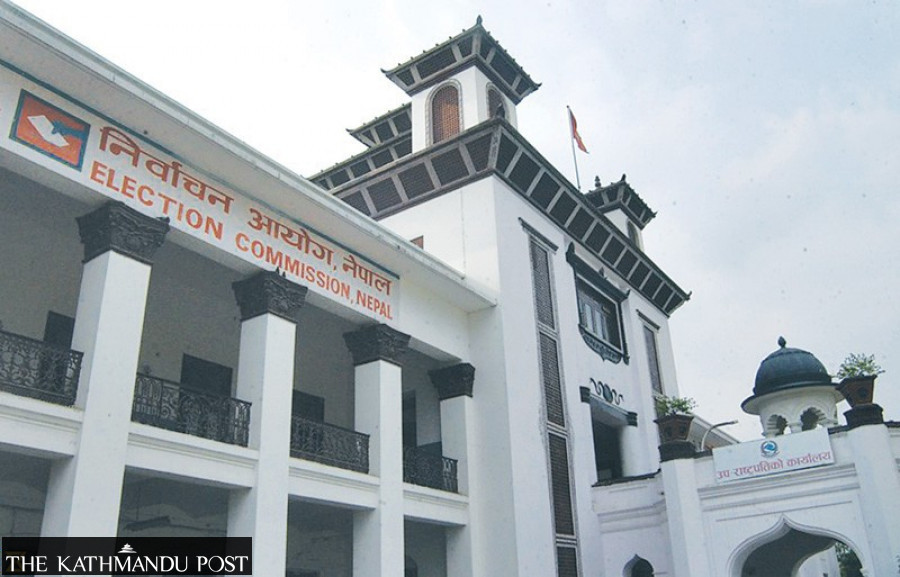National
Fringe parties demand level playing field
As local elections draw close, candidates not getting uniform symbols puts them at a disadvantage, politicians say.
Binod Ghimire
For the last three months, fringe parties have been busy lobbying for a uniform election symbol for party candidates across the country.
As the local level election dates inch closer, they have expedited their efforts to pressurise the Election Commission and the government to ensure their candidates can contest the polls taking the election symbols the respective parties got while registering with the Election Commission.
As many as 80 political parties have been registered for the local elections scheduled for May 13. The commission has recognised 79 of them to contest in the polls. However, only six political parties that got the national status from the 2017 general elections will get the same electoral symbol across the country. The remaining 73 will not have uniform electoral symbols for all their candidates. They will have different electoral symbols within the same local level or even in the same ward.
“This is discrimination and an example of larger parties’ hegemony,” Deepak Uprety, chief of the Central Secretariat Management of Bibeksheel Sajha Party, told the Post. “We have been raising the issue for months, to no avail.”
The parties that have not got the national status have continuously been lobbying and staging protests to have the “discriminatory” provision revoked.
During a meeting at the Election Commission on Friday, they strongly raised the issue before the election officials and members of the ruling parties. In response, the officials reiterated that they were positive about addressing their demands but the existing law binds them.
“The decision was taken as per the provisions in the existing laws. We cannot go beyond their limits even if we are positive about the concerns,” Shaligram Sharma Poudel, a spokesperson for the commission, told the Post. “The commission is not the body that makes the law.”
Clause 26 (6) of the Local Level Election Act says only the candidates of the parties that have the status of national parties get the election symbol assigned to the respective parties. The Political Party Act 2017 defines a national party. Clause 52 of the law says a party that secures at least 3 percent vote share under the proportional category and wins at least one seat under the first-past-the-post system is recognised as a national party.
Only CPN-UML, Nepali Congress, CPN (Maoist Centre), CPN (Unified Socialist), Janata Samajbadi Party and Loktantrik Samajbadi Party qualify as national parties.
The fringe parties first raised the issue with chief election commissioner Dinesh Thapaliya on December 22 last year and drew the government’s attention to it on several occasions. They maintain that the decision to deprive them of the election symbols is against the International Convention on Civil and Political Rights.
Issuing a joint statement on Thursday, the small parties threatened to launch nationwide protests and challenge the decision in the Supreme Court if the commissions don't review the arrangement. “The provision gives superiority to the national political parties in a way to discourage the other parties,” read the statement.
Uprety of Bibeksheel Sajha pointed out the practice in the past that the candidates from the same party for ward chairperson and ward members were given different symbols. “We have to spend our whole energy during the campaign to make voters aware of our election symbols in the particular local level or wards while people already know the symbols of the national parties,” he said.
Experts on election affairs say the provision was introduced to stem the mushrooming of political parties. They say it is uncommon from the global perspective for a small country like Nepal to have 79 parties contesting local elections.
“Do we actually need so many parties?” Sudheer Shah, a former election commissioner, told the Post. “I think no. Therefore, I have no objection to the provision.”
However, others don’t buy the argument. Pradip Pokharel, chairperson of the Election Observation Committee Nepal, said that in the multi-party democracy every party must get the level playing field.
“Let people decide who they want to choose. It is undemocratic to create two types of setting for the parties competing with each other,” he told the Post. “The provision was introduced with ill intention, which must be removed.”
Constitutional experts too echo his opinion. Senior Advocate Dinesh Tripathi, who specialises in constitutional law, said that every party must be allowed to contest the elections on an equal footing.
“The major parties unnecessarily put the rigid provision in the Local Election Act,” Tripathi told the Post. “I think it is too late for local elections. It has to be removed before the federal elections.”
Fringe party leaders say even if the commission cannot give the same symbol across the country it can do that at least in each local level. Constitutional experts say that is possible. “I don't think it will be illegal to give the same election symbol to fringe party candidates across the local level,” advocate Mohan Acharya, who specialises in constitutional law, told the Post. “This could be a middle path to address the issue for now.”




 18.12°C Kathmandu
18.12°C Kathmandu














